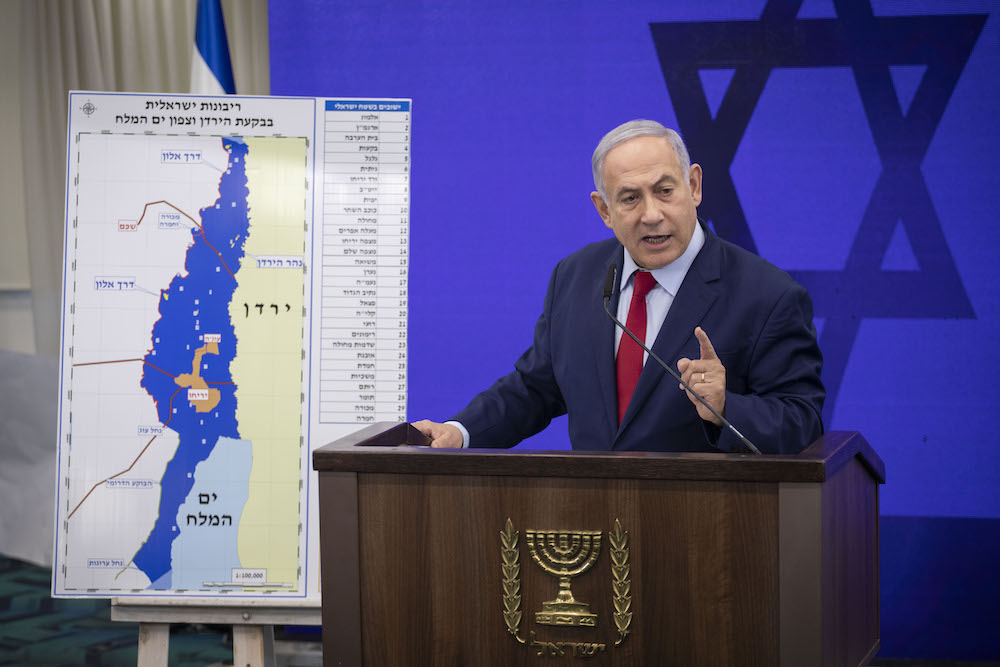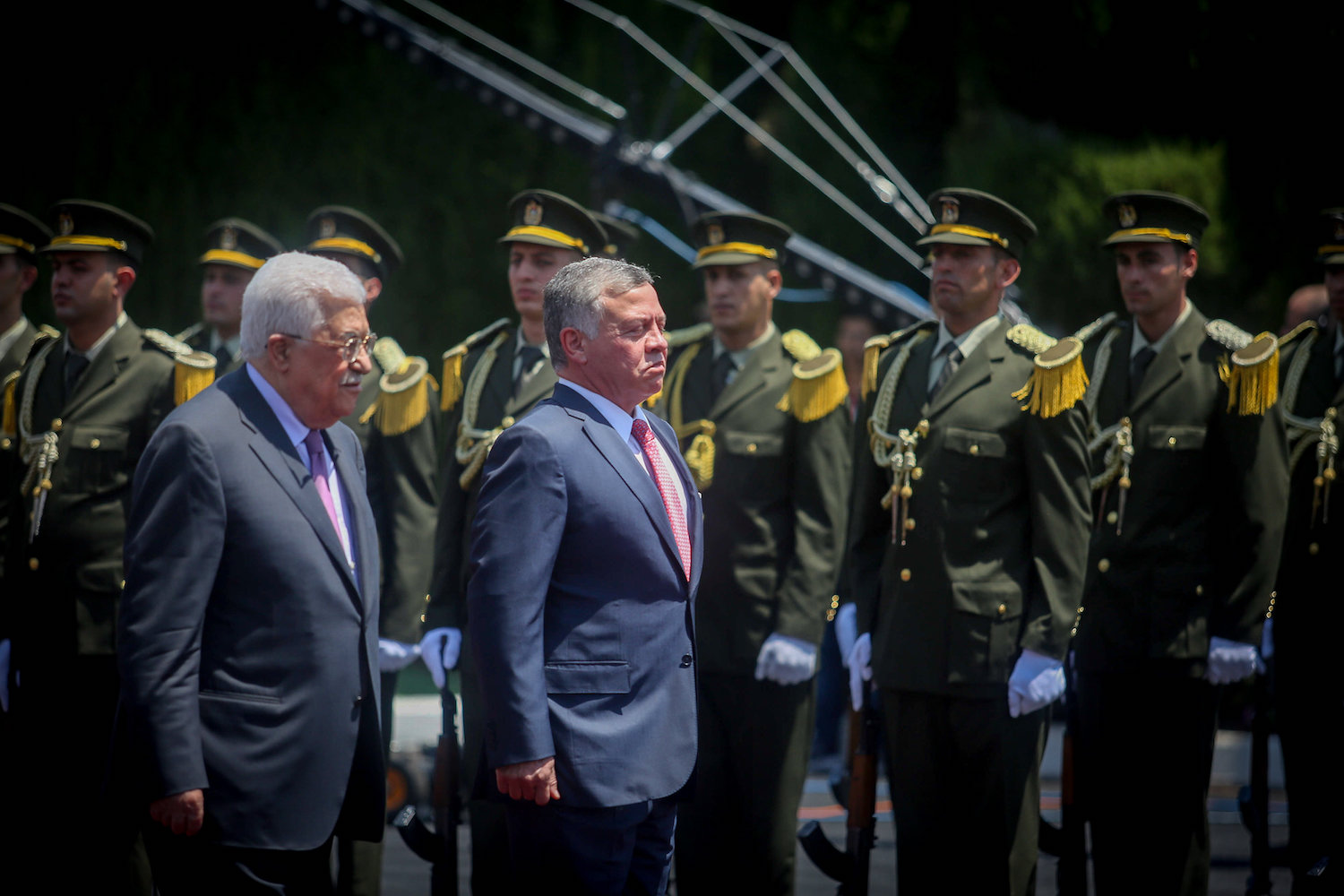It turns out that Benny Gantz, Prime Minister Netanyahu’s centrist rival, also has a vision of Israel annexing the Jordan Valley. During a visit to the area in the occupied West Bank, Gantz announced on Tuesday that the Jordan Valley is “Israel’s eastern defensive shield in any future conflict. We view this land as an inseparable part of the State of Israel.” Following the elections, Gantz continued, he would extend sovereignty over the valley in a “nationally-agreed upon move” and in coordination with the international community.
This is not a new position among the hawkish segment of the Israeli center. A strategic plan published in October 2018 by the National Security Research Institute, the ideological home of former IDF generals such as Gantz, states that Israel must already declare the Jordan Valley a strategic area that will remain under Israeli control until Israel reaches a sufficient security agreement.”
It is also true that Gantz’s new caveats — that the Jordan Valley’s annexation would involve national consensus and international coordination — may render the declaration baseless. Aside from U.S. President Donald Trump (and even that is not entirely certain), the “international community” is unlikely to accept the move.
Yet, even if he has no real intention of annexing, Gantz has consciously chosen to deploy the rhetoric of the Israeli right, for whom “annexation” has become le bon ton, a litmus test for any political figure.

Gantz’s remarks are somewhat reminiscent of Netanyahu’s 1996 election campaign slogan: “Making a Secure Peace.” Netanyahu had no intention of making peace then, much as it appears Gantz has no intention of carrying out annexation today. However, three years after the Oslo Accords, Netanyahu was compelled to embrace the world of the Israeli center-left at the time, in which the word “peace” was in a class of its own. This is the story of Israeli politics over the last 25 years: peace is out, annexation is in.
That may not be as terrible as we think. In some regards, it is almost regrettable that the right-wing bloc, according to recent polls, won’t be able to secure 61 Knesset seats in the upcoming March elections. Should Netanyahu win, it is difficult to imagine how he will get out of his explicit promises to immediately annex the Jordan Valley. In the current political reality, annexation is the best gift opponents of the occupation can hope for.
This does not mean that things need to get worse before they get better. Annexation will rattle the status quo of endless occupation and settlement expansion, which has become very comfortable for Israel. It will force Israeli society, and parts of the international community, to return to discussing a political solution to the conflict, which has all but disappeared. And it will force supporters of the two-state solution, and even supporters of a single state, to step outside their comfort zone and comport their vision to the reality on the ground.
Contrary to what one might think, the impact of annexation on Israel’s permanent borders, or the feasibility of the two-state idea, need not be decisive. Israel annexed East Jerusalem more than 52 years ago, just days after the end of the 1967 War. This did not prevent official and unofficial Israeli representatives from discussing annexation during various negotiations with the Palestinians, and agreeing that the future State of Palestine would control the city’s Palestinian neighborhoods.

This is true also of former Prime Minister Ehud Olmert, who made a political career in the Likud party for promising to keep Jerusalem united “for eternity” (Olmert even starred in Netanyahu’s 1996 campaign ads, accusing Labor’s Shimon Peres of “dividing Jerusalem”). A decade later during peace talks with Palestinian President Mahmoud Abbas, Olmert proposed dividing the city. And the annexation of the Golan Heights in 1981 did not prevent Ehud Barak — and according to reports, even Netanyahu himself — from discussing the possibility of returning the Golan to Syria with Hafez al-Assad.
Annexation won’t especially improve the situation of the few Israeli settlers living in the Jordan Valley. Today, and especially after a decade of Netanyahu’s rule, the Green Line is almost entirely irrelevant, and settlers who live in the West Bank enjoy nearly identical rights to Israeli citizens inside the 1948 borders.
Annexation may remove some of the barriers currently imposed on settlers, but it may also make life difficult for them. When the Jordan Valley becomes subject to official Israeli law — rather than to military orders — it may be much more difficult to confiscate land, evict Palestinians, and establish Jewish-only settlements.
Even if Israel decides to grant residency status to the Palestinians it annexes instead of full citizenship (as in East Jerusalem), that status will allow them to move freely and work inside Israel, which will certainly improve their current situation. Yet there is little reason to believe that annexed Palestinians will give up their national aspirations: this did not happen in East Jerusalem after 52 years of occupation, nor has it happened with Palestinian citizens of Israel.
But there is a chance that annexation could boost not only the Palestinians who find themselves under Israeli sovereignty, but the Palestinian struggle writ large. Annexation would force the Palestinian Authority to emerge from its coma; it would make it easier to dismantle the PA, force Israel to regain direct control over the West Bank, and return to a struggle for civil rights in one democratic state between the river and the sea, akin to the PLO’s original political program.

If Israel does in fact refuse to grant full civil rights to the Palestinians, it will be even easier to show that the regime in the West Bank is not a temporary problem of “disputed territory,” as Israel likes to claim. Apartheid will become official state policy.
Annexation will also bring the Palestinian issue back to the center of the Arab world’s attention. The Jordanian government is already facing strong opposition to its peace agreement with Israel. Recent demonstrations in the Hashemite Kingdom against the gas agreement with Israel are further evidence of the disapproval. Should annexation come to pass, it is hard to see King Abdullah sticking to the agreement with Israel if he wants to maintain his rule.
Jordan may turn into Palestine, as Netanyahu hoped for in his 1993 book A Place Among the Nations — but this “Palestine” will have an army that could point its guns at Israel in solidarity with their brethren from the other side of the Jordan River.
Netanyahu, who knows the international arena better than any other leader on the right — and possibly in Israel — is well aware of these things. That is why, during his decade in power, he avoided taking drastic steps while at the same time perfecting the status quo. His policies ensured creeping annexation of growing settlements, the erasure of the Green Line from Israeli consciousness, and the complete normalization of the occupation.
Netanyahu hoped that the Israeli public, international community, pro-Western Arab regimes, and perhaps the Palestinians themselves would eventually agree to Israeli rule over the entirety of the land and take the option of a Palestinian state off the table. It worked brilliantly; even Gantz, Netanyahu’s biggest rival, does not speak of two states.

But it may have worked too well for the prime minister. Precisely because a Palestinian state does not seem to be at stake, the religious-nationalist right turned annexation into a political demand — something it did not do in its 40 years sitting in governments since the right took power in 1977. If the settlements succeeded in preventing the establishment of a Palestinian state, they say, why not move on to the next stage and realize the vision of a Greater Israel?
As long as Netanyahu was politically powerful, he could wave off talk of annexation by the likes of Naftali Bennett. But as soon as his legal troubles began closing in on him, Netanyahu’s space for maneuvering dwindled. He has no choice but to embrace the language of sovereignty, which only a few years ago lay somewhere in the dormant fringes of the right.
It is not that Netanyahu disbelieves in exclusive Jewish sovereignty between the river and the sea; he just did not believe that implementing it had to be done through formal annexation. Today, it is no longer about striking a deal of annexation in exchange for political immunity. It is either annexation or prison.
There is no doubt that annexation is a violation of international law, which would be forcibly imposed on Palestinians and will officially turn Israel into an apartheid state. It must be opposed. But after so many years under the rule of the Greater Israel camp, it may be time to put the right’s path to the test. Annexation will make clear the real debate in Israel-Palestine: equality and self-determination for each nation living between the Jordan and the sea, or Jewish supremacy.
This article was first published in Hebrew on Local Call. Read it here.


